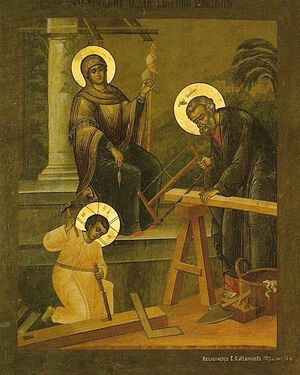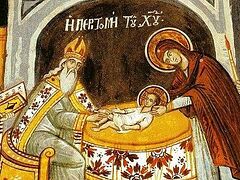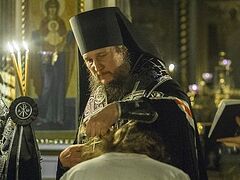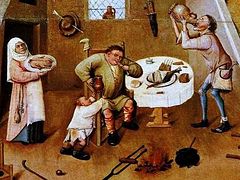 The feast of the Circumcision of the Lord and the commemoration of St. Basil the Great are connected to each other. The Church tells us of the mystery of obedience. We all remember the words: “Obedience is higher than fasting and prayer.” But as St. Seraphim of Sarov says, we need to understand this properly. It means that here we are talking first of all about God’s laws, about what clearly relates to spiritual life. But not only about this. To this relates everything that is done according to natural human customs, be they family or civil laws; everything that does not contradict a Christian conscience. As the apostle Paul says, Whatsoever things are true, whatsoever things are honest, whatsoever things are just, whatsoever things are pure, whatsoever things are lovely, whatsoever things are of good report; if there be any virtue, and if there be any praise, think on these things (Phil.4:8). The Church speaks about such obedience as being filled with remembrance of God, love, and faithfulness to Him. Behind simple earthly obedience an incomparable, great depth can be discovered. Christ manifests this obedience from His very birth, and even before His birth. We recall how His Most Pure Mother and Righteous Joseph the Betrothed, submitting to the imperial command concerning the population census, come to a city where they are to give birth to Christ.
The feast of the Circumcision of the Lord and the commemoration of St. Basil the Great are connected to each other. The Church tells us of the mystery of obedience. We all remember the words: “Obedience is higher than fasting and prayer.” But as St. Seraphim of Sarov says, we need to understand this properly. It means that here we are talking first of all about God’s laws, about what clearly relates to spiritual life. But not only about this. To this relates everything that is done according to natural human customs, be they family or civil laws; everything that does not contradict a Christian conscience. As the apostle Paul says, Whatsoever things are true, whatsoever things are honest, whatsoever things are just, whatsoever things are pure, whatsoever things are lovely, whatsoever things are of good report; if there be any virtue, and if there be any praise, think on these things (Phil.4:8). The Church speaks about such obedience as being filled with remembrance of God, love, and faithfulness to Him. Behind simple earthly obedience an incomparable, great depth can be discovered. Christ manifests this obedience from His very birth, and even before His birth. We recall how His Most Pure Mother and Righteous Joseph the Betrothed, submitting to the imperial command concerning the population census, come to a city where they are to give birth to Christ.
On the eight day after his birth, the Savior was circumcised in accordance with the commandment given to Abraham, when God promised to make an eternal covenant with him and his descendants. The pure, sinless Lord receives the sign of reconciliation, which He established Himself, as God and the Creator of the Law. From the first days of His Coming to earth, He humbly submitted to the prescribed law, showing that all the Old Testament foretypes find their completion in Him. The fleshly circumcision of Old Testament ends with the circumcision of the Second Adam, and the New and true Testament begins, sealed by spiritual circumcision at the cost of His Blood. Christian Baptism is the true spiritual circumcision, a sign of belonging to a new people that partakes of the life-creating death and Resurrection of the Lord. All who have been Baptized in the name of Christ must learn this mystery of obedience. On this day, the Infant God was given the name that the heavenly herald revealed to Righteous Joseph before the Lord’s birth. Jesus means Savior. This name revealed His service on earth, for the sake of which the Pre-eternal God and Creator became man. The name Jesus expresses the whole mystery of our salvation. He humbled himself, and became obedient unto death, even the death of the cross. Wherefore God also hath highly exalted him, and given him a name which is above every name: That at the name of Jesus every knee should bow, of things in heaven, and things in earth, and things under the earth; And that every tongue should confess that Jesus Christ is Lord, to the glory of God the Father Phil. 2:8–11). Those who have been baptized into Christ, have put on Christ.
And Saint Basil the Great reveals to us with exceptional force what it means to be a baptized person, what the mystery of obedience means. Since childhood, even before receiving Baptism, he humbly obeys everything taught to him in his family (it’s impossible not to notice that this family was quite extraordinary, literally an icon of the family, especially pertinent to our time. In is were ten children, five of whom are counted among saints, and its main caregiver was his grandmother Macrina, a disciple of St. Gregory the Wonder Worker of Neocaesarea). He studiee rhetoric, which is the art of expressing thoughts precisely and vividly, under the guidance of his father. Later, he pursued a secular, as we would say now, education in Caesarea of Cappadocia, Constantinople, and finally, in Athens. He modestly taught rhetoric, not aspiring to anything great. But after receiving Baptism, he diligently studied the alphabet of spiritual life. Soon afterwards, in order acquaint himself with the monastic life, he travels to Syria, Palestine, and Egypt, where he entered into close communion with a number of ascetics. This is where he learned the science of more perfect obedience, which could be talked about at length. We’ll mention only, that upon returning from his journey, he distributed his possessions to the poor and retreated to the desert near Neocaesarea, engaging in ascetic struggles before entering into church service. This is one aspect of his life, the external one, which became increasingly significant due to its inseparable connection with love for God.
As St. Ephraim the Syrian testifies, when St. Basil preached, a white dove sang the words into his ear that he would pronounce. And when he celebrated Divine Liturgy, he was like a pillar of fire rising from earth to heaven. Even to the present day, the Orthodox Church prays at our most important feasts using his words, filled to overflowing with lofty theological inspiration. He took care to celebrate the memory of the martyrs and honor the holy relics with especial solemnity. He was the first of the Orthodox fathers to clearly and boldly announce that the Holy Spirit is true God, of one essence with the Father and the Son. Inspired by the very Spirit of God, being in communication with the Holy Trinity by the gift of grace, St. Basil with incomparable clarity and precision formulated such main theological concepts as essence and hypostasis, never separating them from the mystery of our salvation and man’s deification. His entire life was a battle against heretics who sowed confusion in the Church. He was a perfect bishop, a living image of Christ, all things unto all, and at the same time, as a human being, he continuously suffered defeats amidst various church divisions and storms.
Today the Church leads us to the mysterious relationship between Christ and His Heavenly Father. It is no coincidence that the Gospel reading at the Liturgy is about how after the feast of the Passover, Christ remains in the Jerusalem temple with the teachers of the Law, who are amazed at his wisdom and answers.
The most important thing here is this mystery of His love for God the Father. His parents find Him after searching for three days, and His mother says to Him, Son, why hast thou thus dealt with us? behold, thy father and I have sought thee sorrowing. And he said unto them, How is it that ye sought me? wist ye not that I must be about my Father's business? (Lk. 2:48–49).1 This is what Christ says. He is human in everything, a Child, but He is with His Father. And they understood not, says the Gospel, the saying which he spake unto them (Lk. 2:50). They couldn’t yet fathom it. Christ has a God-man consciousness, thanks to which He lives in constant communion with His Father. “Don’t you know, that I must be about my Father’s business?”
Christ is twelve years old; He witnesses His independence from his Mother and Righteous Joseph, and also of His obedience to them. Because further on, we hear: And he went down with them, and came to Nazareth, and was subject unto them (Lk. 2:51). But in order to hide His perfect, special service, He was absent for three days, and His Mother with Righteous Joseph are not able to understand this. We are invited to penetrate into these relationships of hidden mystery, the infinite mutual love between the Heavenly Father and Christ.
I must be about my Father’s business. This is a revelation of Christ, which we should heed. This extraordinary testimony passes through the entire Gospel. Christ is always with His Father, He cannot but be with Him. We should learn that the mystery of life consists in being with Christ in the mystery of God the Father, Who contains all the love that is in Him. Throughout all these events, Mary kept all these things, and pondered them in her heart (Lk. 2:19).
The Gospel is filled with joy: And Jesus increased in wisdom and stature, and in favour with God and man (Lk. 2:52). This does not hinder Him from remaining independent, in a certain sense hidden from his closest ones, to whom He begins to reveal His mystery. And He calls us also to abide in the mystery of Pascha, in the mystery of His Father, and do His will.
“Don’t you know that I should abide in what belongs to my Father?” How astounding these words are, absolutely incomparable to anything! We should hymn glory to God, knowing that this twelve-year-old Child, Jesus Christ, already has a mind that surpasses any human intelligence; He is with His Father, and always does what is pleasing to Him. He is all love for His Heavenly Father, and at the same time He is all obedience to His Mother and Righteous Joseph. Everything in the Church is done for the sake of His being sent to the world, for Christ abides with the Father in order to reveal Who His Father is to mankind.
Let us pray to the Lord, so that we would be granted entry into the mystery of His love, humility, meekness, and patience. We shall dedicate ourselves to all that He does for the sake of our salvation. Like His Most Pure Mother, Who kept all these things in Her heart, let us also preserve this gift in our hearts and let us increase, like Him and by His gift, in wisdom and stature, and love with God and man. In that hour the Most Blessed Virgin did not understand Her son’s words, but she kept them, and gradually she would be granted to fathom their fulness. It will all be revealed to Her—Christ’s Cross and the glory of the Father, manifested in the Resurrection.
This is the mystery of communion with the Lord in love and truth, which the Lord reveals to those who are faithful to Him, granting them new eyes and new hearts. Through the Holy Spirit we are given to know that Christ is of one essence with the Father and that the Father does not abandon Him for a moment. We must not doubt that God does not abandon us for a moment. God is with us. He is with us. He saves us. Only this has any meaning. Everything else is in the mystery of obedience, and our response of love for Him.



